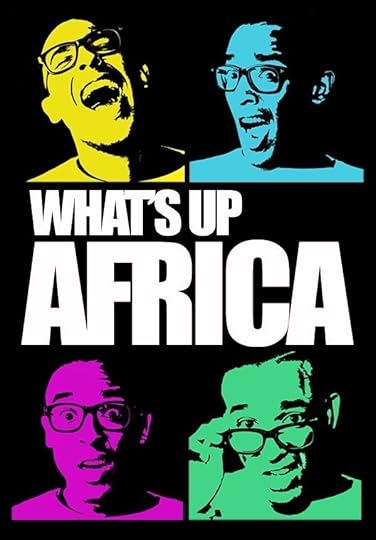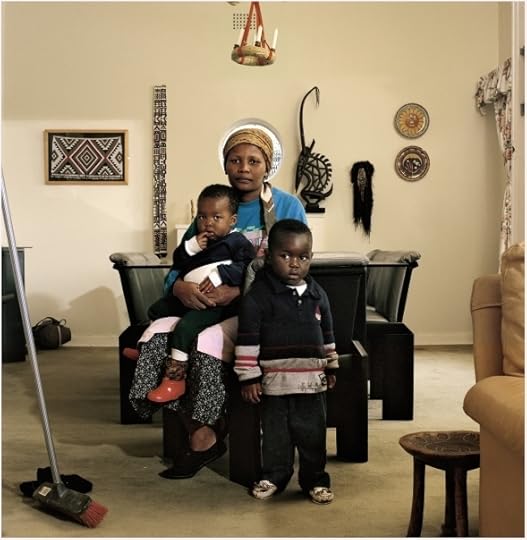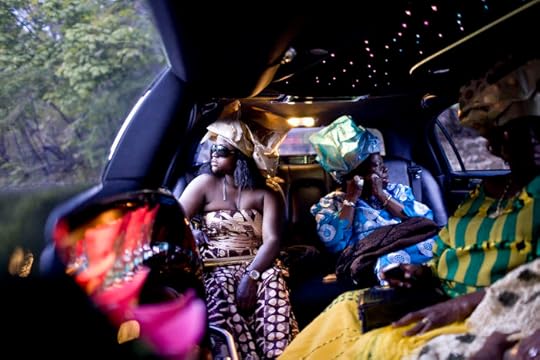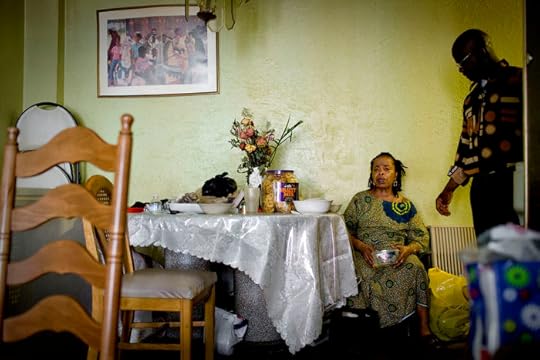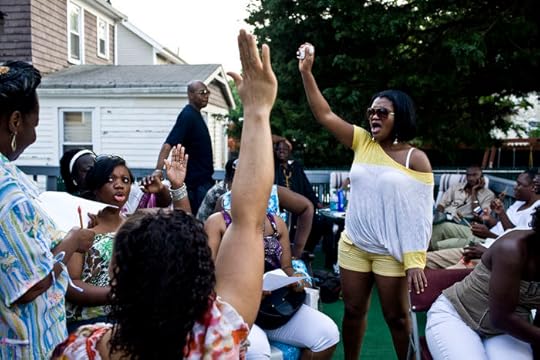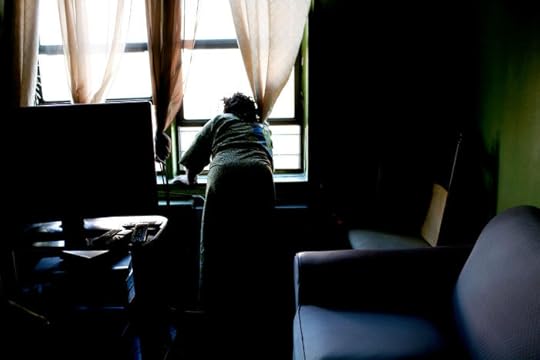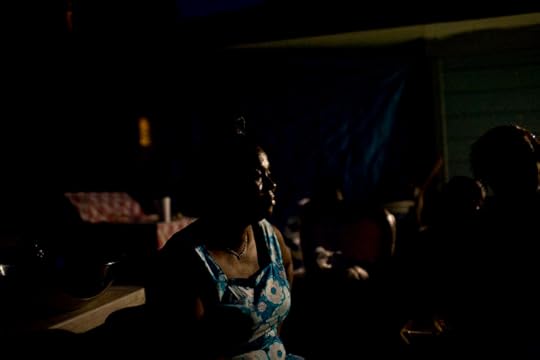Sean Jacobs's Blog, page 618
August 12, 2011
Music Break / Fatoumata Diawara
Easy listening. 'Bassa' is a song by the Côte d'Ivoire-born, Mali-raised and now France-based artist Fatoumate Diawara. We could use a translation — because maybe it's no easy listening at all. Anyone?








Music Break / Fatoumate Diawara
Easy listening. 'Bassa' is a song by the Côte d'Ivoire-born, Mali-raised and now France-based artist Fatoumate Diawara. We could use a translation — because maybe it's no easy listening at all. Anyone?








"What's Up Africa!"
What's Up Africa describes itself as "Europe's first video blog focused on Africa." Produced in the Netherlands by lawyer-turned-broadcaster Ikenna Azuike, it is slowly building an audience, bringing us "… what's hip, creative and making the news in Africa." 26 episodes later this is the place where the new land grab by European firms of African agricultural land is described as "buying 10 Hollands," he skewers leaders like life presidents like Yoweri Museveni, does sketches (since episode 3) and also Ikenna recruits his parents to do silly things on camera. Questlove from The Roots, a fan, has raved on Twitter that "a star is born." (The right kind of celebrity endorsement always helps.) Anyway, I really enjoy the show, not least because we appear to mostly read the same sources (he shouted us out here), but also also because of Ikenna's incisive commentary on media and cultural politics delivered with irreverence and humor. Ikenna agreed to answer some questions for AIAC.
Where did the idea for What's Up Africa [hereafter WUA] come from?
I got the idea to start WUA after watching US video blogger Ray William Johnson, he's my inspiration for the style of the videos. I'd go as far as to say he's defined an entire new media genre. As for the content of my show, I was inspired by one of my comedy heroes Jon Stewart of The Daily Show. I knew about lots of great blogs sharing news about cool stuff going on in Africa but couldn't find anything offering video content or Daily Show style news satire, so I decided to start myself. I love raising the profile of African creative talent with a wider and international audience. It's great for those artists and it's fantastic for "brand Africa". But, WUA is not just about pointing out good stuff I use my show to be critical about serious issues, comedy is undoubtedly a powerful tool to change people's attitudes.
Though you occasionally throw in Dutch references, it was clear from the start that it was a global show.
I focus on sub-saharan Africa but, yes, I do like throwing in Dutch references now and then.
In your day job you're a journalist and producer at RNW. Can you tell us something about what RNW wants to achieve with its broadcasts?
Actually, I split my time at the moment between making WUA and working on Strawberry Earth–a blog and events company I started together with my girlfriend. Africa and environmental issues are my passions in life.
Our goal with WUA and the radio shows at RNW is to offer people a fresh and original perspective on news in Africa (with a little fun thrown in too). We have a broad network of correspondents throughout sub-saharan Africa, a young an dynamic team on the desk in Hilversum and we're developing a distinct tone of voice in our reporting. A voice that is critical and fair without being patronizing or 'institutional'. It's also fair to say that WUA is there to show that RNW is an innovative and creative journalistic platform.
What is the influence, if any, of RNW in "global news"? Tell us about its reach? Do Africans listen to it? Can they get it on their radio dial?
Stories from RNW are picked up fairly regularly by the Reuters and (the Dutch) ANP news wires – that happens because we're writing strong, balanced and insightful reports and getting scoops. It's worth mentioning that the Dutch journalist of the year in 2010 was from RNW last year (for a report on abuse in the Catholic Church which sparked an international outcry). Aside from that though, because the ICC is located in The Hague a lot of international news agencies look to us for news and updates – we are closest to the action in a way. Our African focussed programmes are getting increasingly popular too – we have over 200 partner radio stations throughout Africa who download and share our programmes. And I'm told, that in the near future Capital FM in Kenya and The Monitor newspaper in Uganda will start hosting WUA. That would be very exciting. I don't have any specific figures on our website traffic.
Has the Internet put a dent in the dominance of the BBC and CNN as the dominant "global news" players?
In short, yes. But the existence of the internet alone isn't the only factor. Rather, the quality of other news providers like Al Jazeera and some very successful blogging platforms like Sahara Reporters. More and more people are indeed getting rid of their television sets and getting news purely from the internet so, it is hugely important for organisations like the BBC and CNN to innovate.
The internet offers massive opportunities for everyone. Look at Ray William Johnson. He makes 4 videos a week now (including his LA vlog and his animated music videos). As a result he's easily reaching over twelve million people a week. I'm not saying that WUA will ever do the same but there is clearly an opportunity out there that is not being grasped by any of the major news platforms right now.
How has the use of social media (which e.g. allow for intercontinental and personal networking) reshaped your identity as someone of African/Nigerian descent living and working in Europe and your relationship to the continent?
Social media has allowed me to become more easily and quickly informed about news throughout Africa, I'm able to easily stay in contact with African friends and family abroad and Africans I don't know personally are also able to 'reach' me through facebook and twitter. So I guess you could say that social media has allowed me to enhance my sense of African/Nigerian identity at a much faster pace than traditional media and in a more 'complete' way – i.e. I'm not just reading traditional news articles about Africa and occasionally talking to friends via the phone, instead I'm interacting on a daily basis with Africans and even able to keep track of niche subjects like particular genres of African music, and talk with others interested in the same topics – that would have been more difficult in the days before social media. This is especially important because it's also enabled me to share experiences with my Dad (who's Nigerian) – something I couldn't do in my previous career as a lawyer.
What's your favorite episode?
Hmmmm. That is a tough one because I like sketches from some shows and newsier items from other shows. I definitely don't feel as though I've made the perfect 'complete' episode yet. That said, I really enjoyed: Leather is Surprisingly Comfortable because it features my Dad and perhaps my favorite music review.
Which audience do you hope to reach with WUA?
Some marketing friends of mine talk about the need for me to reach "African cultural creatives" living in Africa and in the diaspora. They might be right but I just want to reach anyone who has an interest in African news, and anyone looking for inspiration in the fields of art, design and music. The response so far has been fantastic. There's no hiding the fact that I speak with a heavy British accent so I was slightly concerned at the start that I wouldn't be accepted as a commentator on content from inside Africa. But it's been the total opposite. I've had emails from West, East and South Africa and people in the US, UK and further afield, all saying they love the show. I am immensely proud of my Nigerian roots and I'm passionate about sharing news from all over Africa, I think that shows through my presenting. Plus, people seem to like me making a fool out of myself… hmmmm… maybe that's all they like actually. Brilliant.
* Follow WUA on Twitter and Facebook.
And the latest episode:








Song and Dance
By Dan Moshenberg
Tuesday, August 9, 2011, was the annual celebration, in South Africa, of National Women's Day. This public holiday commemorates August 9, 1956, the women's march on the Union Buildings in Pretoria, in protest of the infamous pass laws. That day 20,000 or so women famously, and heroically, chanted, shouted, screamed: "Wathint'Abafazi Wathint'imbokodo!". Translation: "Now you have touched the women, you have struck a rock!"
That was 55 years ago.
On Tuesday morning in South Africa (I am visiting here this week), the morning news talk shows, such as Morning Live on SABC2, celebrated with song, dance, some discussion. Women, and men, challenged the nation to do more, to do better. It was both festive and moving.
At the same time, there was a silence at the center and heart of the celebrations.
That silence was the abuse and death, in today's South Africa, of women in childbirth. And that national silence was shared by major Western news outlets, such as The New York Times, Washington Post, the Guardian, the BBC, and others.
On Monday, August 8, 2011, Human Rights Watch released a report entitled "Stop Making Excuses": Accountability for Maternal Health Care in South Africa. Pregnant women, maternity patients, in the Eastern Cape are regularly abused. They are directly abused by so-called health care providers, and they are generally abused by the lack of accountability in the system. This results in women dying in large numbers.
Women describe being physically and verbally abused. They are pinched, slapped, and roughly handled during labor. Women in labor are turned away from clinics, without examination or explanation. Women, weak from childbirth, are told to clean up after giving birth. They are left unattended, and uninformed, for hours and sometimes days.
That's South African women. For refugee women in South Africa, the conditions are far worse.
What has the provincial or national government done in response to this horror? Nothing. Less than zero and worse than nothing. They have colluded through what might be called a system of non-accountability. And where's the world press? Nowhere to be found.
1956: "Wathint'Abafazi Wathint'imbokodo! Uzakufa!" "You have touched the women, you have struck a rock, you have dislodged a boulder, you will be crushed!"
2011: "Stop Making Excuses!"
Photo Credit: David Goldblatt.








August 11, 2011
August 11, Chad
There's still time left to recognize Chad's Independence Day today, and keeping with our regular feature, we're posting popular music from the country.
First up is a short clip of Mounira Mitchala, handling a live show in Paris:

Being part of the French sphere of influence, Chadians are listening to and making music popular in other Francophone African countries such as Ndombolo, Coupe Decale, Zouk, and Rap.
Jorio Stars, a Cameroonian and Chadian collaboration(?):
[image error]
A nice dance song and video by Pyramydes:

And a Rap song with a beat that sounds (a little bit) like it's sampling Triggerman!

___
Rap is no surprise really, partly because of the worldwide trend, but also because the most famous rapper of Chadian origin is non other than the one MC Solaar:
Today, it seems that there are nuff home studio recordings by Chadian teenagers, if youtube has anything to say about it.
The francophone alignment has historical precedence, folks like Maître Gazonga were making Soukous hits in the 1980′s:

There's also the Arabic language sphere of influence which produced this Auto-tuned wonder set to a propaganda video:

It's a symptom of the digital age that when finding new music information may be distorted, as Sahel Sounds put so eloquently.
This is might or might not be Farge Elhaloani, and he might or might not be a Sudanese singer performing in Chad:

And finally to smooth out your evening…









Music Break / Lalcko
French-Cameroonian rapper Lalcko released a strong record earlier this year: 'L'eau lave mais l'argent rend propre.' Ever seen this video he recorded 'between Yaoundé and Douala' for his 2007 track 'Lumumba'? It's dedicated "to all my Lumumbas born of aggression and cemented by the fight."








More to Staten Island than 'Mob Wives'
Photographer Glenna Gordon, no stranger to AIAC, is working on a new project in Staten Island, home to the largest population of Liberians outside of Liberia. I asked her if I could publish some of the work here. You can view the full set here. She also sent this note:
Most New Yorkers still think of Staten Island as working class Italian, but mainly due to the huge influx of West Africans from Liberia, Guinea, Ivory Coast and elsewhere, the black population of Staten Island has grown by 12 percent in the last decade. It's hard to say how many Liberians and others live in Staten Island since many people haven't sorted their immigration status. But there are plenty-o. I'm now splitting my time between New York and West Africa, and I've started a new photo project on Staten Island. I first went out there for a visit in mid-April. I attended a meeting of the Staten Island Liberian Community Association, which was a mix of formalities, community news, and a very loud argument between two old ma conducted in rapid fire Liberian English. I was invited to come back and photograph a special mother's day program a couple of weeks later. And that's how I found myself riding a white stretch limo around Staten Island on a Saturday night with a group of old Liberian ladies dressed in their fanciest lapa. I'm excited about working in New York for a change, and where this project might go.








There's more to Staten Island than 'Mob Wives'
Photographer Glenna Gordon, no stranger to AIAC, is working on a new project in Staten Island, home to the largest population of Liberians outside of Liberia. I asked her if I could publish some of the work here. You can view the full set here. She also sent this note:
Most New Yorkers still think of Staten Island as working class Italian, but mainly due to the huge influx of West Africans from Liberia, Guinea, Ivory Coast and elsewhere, the black population of Staten Island has grown by 12 percent in the last decade. It's hard to say how many Liberians and others live in Staten Island since many people haven't sorted their immigration status. But there are plenty-o. I'm now splitting my time between New York and West Africa, and I've started a new photo project on Staten Island. I first went out there for a visit in mid-April. I attended a meeting of the Staten Island Liberian Community Association, which was a mix of formalities, community news, and a very loud argument between two old ma conducted in rapid fire Liberian English. I was invited to come back and photograph a special mother's day program a couple of weeks later. And that's how I found myself riding a white stretch limo around Staten Island on a Saturday night with a group of old Liberian ladies dressed in their fanciest lapa. I'm excited about working in New York for a change, and where this project might go.








Staten Island isn't just about 'Mob Wives'
Photographer Glenna Gordon, no stranger to AIAC, is working on a new project in Staten Island, home to the largest population of Liberians outside of Liberia. I asked her if I could publish some of the work here. You can view the full set here. She also sent this note:
"Most New Yorkers still think of Staten Island as working class Italian, but mainly due to the huge influx of West Africans from Liberia, Guinea, Ivory Coast and elsewhere, the black population of Staten Island has grown by 12 percent in the last decade. It's hard to say how many Liberians and others live in Staten Island since many people haven't sorted their immigration status. But there are plenty-o. I'm now splitting my time between New York and West Africa, and I've started a new photo project on Staten Island. I first went out there for a visit in mid-April. I attended a meeting of the Staten Island Liberian Community Association, which was a mix of formalities, community news, and a very loud argument between two old ma conducted in rapid fire Liberian english. I was invited to come back and photograph a special mother's day program a couple of weeks later. And that's how I found myself riding a white stretch limo around Staten Island on a Saturday night with a bunch old Liberian ladies dressed in their fanciest lapa. I'm excited about working in New York for a change, and where this project might go."








An American Singer in Mali
Collaborations between American and West African, specifically Malian, musicians are nothing new (see below). But, Adam Klein, a successful American folk musician from Georgia who has a long association with Mali (the locals call him by the name Lassine Kouyate) plans that and more: Klein is working on an album with Malian musicians that will do three things that together will present a new departure in these kinds of collaborations: that is blend "… rustic acoustic Mande music with American roots music," records the music in Mali and plans to perform an entire record of original songs "in Bambara with traditional instrumentation." He is also making a documentary film. I sent Klein some questions about the project.
Can you tell us more about the project?
I travelled to Mali in early 2010 to record an album of original songs in the Mande style, sung in Bambara, accompanied by traditional Malian and West African instrumentation such as kora, ngoni, calabash, tama (talking drum), djembe, and more. I also brought filmmaker Jason Miller of Eikon Productions (LA via Georgia). Jason shot a making-of-the-record documentary film which includes footage of the recording sessions, footage from the village in which I served with Peace Corps [years before], glimpses into the lives of some of my close Malian friends, shots from the Festival sur le Niger in Segou, as well as interviews with various folks about Malian life, culture, and development. The main three narrative strands of the as-yet-unfinished and unnamed film include the making of the album, learning about the lives of Malians through my friends' stories, and my personal struggle to remain connected with and supporting my Malian friends and community from afar. The album has not yet been released as I've intended to put it out packaged together with the film. It remains to be seen whether the film will be a 25-35 minute short or a tv-hour length piece.
In a previous interview the journalist highlighted the fact that you're one in a long line of American, specifically Jewish American, musician collaborating with Malian musicians in Mali.
I don't think it's necessarily new that an American, or a Jewish-American musician is making music in Mali. Many people have travelled to Mali to study and play music, including my friend Oran Etkin, a fantastic jazz musician who plays in a few Mande ensembles in New York (Kelenia and Mandingo Ambassadors) and Jeremiah Lockwood (of Sway Machinery). What I think is new about this project is it may mark the first time (or certainly first time in recent years) that an American singer/songwriter is blending rustic acoustic Mande music with American roots music, recording in Mali, and performing an entire record of original songs in Bambara with traditional instrumentation. These aspects definitely make this project unique.
How different is your project from the collaborations pioneered by the likes of Ry Cooder?
Ry Cooder, Taj Mahal, Bela Fleck, Damian Albarn, and many others have collaborated with Malian musicians in Mali, such as some of the greats–Ali Farka Toure, Toumani Diabate, Oumou Sangare–and those are important records which I love. I think this project is a bit different because I bring an understanding of Mande culture and a proficiency in Bambara which allows me to be at home in Mali and amongst its people. The lyrics of the songs are either original or co-written with Malian friends, and the songs are meant to speak to and inspire the Malian people, as much Mande music does, about development issues, hope, peace, and more. Song themes include the dignity of work, marriage as an institution greater than a father's sale of his daughter, community, brain drain (the need for educated, Malian expats to help develop the country), HIV and other diseases, etc. I'm not adding color to another's material. I'm bringing songs influenced and inspired by Mali back home, and the talented Malian musicians are adding their voices, instruments, and instincts. Stylistically, it may not be a perfect Mande record, but the Malians who have heard it have been extremely supportive and excited about it. Plus the added medium of the film allows a broad audience to learn more, 'discover', and experience Mali through the lens of my experience there and my friends' lives.
Can you say something about the recording industry in Mali? We know Mali has produced a number of musicians that have made careers in the West. Can you live of music in Mali?
I'm not intimately familiar with the lives of Malian musicians in general, although I've become friends with some. The community I lived in during my Peace Corps service had only one griot and there were few musicians around. Griots, or djelis in Bambara, are the traditional praise singers, bards, and oral historians of West Africa, who play a prominent role at life cycle events- baby namings, weddings, funerals, etc. They're also traditionally conflict resolvers and peacemakers. A number of griots in Mali, then, are hired to serve as musicians and to fulfill the djeli's functions at such events. I suspect the most renowned griots, especially in Bamako and possibly regional capitals, make a living off of their music and praise singing there. And, since strong social structures are in place in Mali as in many communal cultures in the global south, I imagine their large extended families are supported by that income. I think it's probably tough for musicians, excluding the popular stars and the many djelimusow (female praise singers), to make ends meet by putting out music there. Once a cassette or CD has been out in the market for a month or more it's bound to have been pirated endlessly and available as 'burned' copies. I've heard, though, that the most famous Malian musicians, like Salif Keita and Oumou Sangare, make a ton of money in Mali alone off the sale of their records. If it's all the rage over there and well promoted with videos on tv and lots of radio airplay, it'll do well financially. But a lot of musicians have weekly gigs or play a few times a week at the bars in Bamako and earn income that way. As far as the recording industry goes, there are a good number of studios and a lot going on- everything from groove-driven Mande rock stuff to acoustic material, hip hop to synth-heavy jams and north desert blues. Bamako's got it going on, for sure.
What is your relationship with the young man featured in the documentary film trailer above?
The young man in the trailer is Samba Diallo, whom I consider to be a younger brother. He was my closest friend and sidekick in Mali and I learned about the culture and its intricacies, how to navigate life in the village, and much of the Bambara I speak, from Samba. He would come by my place each day and we'd spend time together, chat in the hammocks in my shade spot, and we'd talk about my work projects, our lives, community members, everything. We have a similar sense of humor, too, which I always thought was funny considering at the time we both lived in our village, Dougouolo, I was 24-25 and he was 12-13. Wonder what it said about me! I learned a lot from Samba and had such a fulfilling experience in Mali thanks in large part to him. Although we only speak occasionally and we're quite distant geographically now, he's definitely one of the most important people in my life and I look forward to our lifelong friendship. He recently took the college entry exam and we'll hear in a few months if he passed. If so, he'll start university in Bamako in spring 2012 and continue his studies and personal development there. If not, he'll have to use his determination, creativity, and high school education to carve out his place in society. He studied hard for the entire year to prep for the test, though, and we're confident he passed.
In the trailer, one of our interlocutors say that while Malians are celebrating 50 years of Mali independence, Mali had only experience development in the last ten years. What is your assessment of political developments in Mali?
I think there has been a lot of rapid development in Mali in recent years. Lots of rural communities have one or more pumps for treated water, I've noticed newly built and expanded school blocks in a number of areas, cell phones are common (I read a statistic that says ~25% of Malians have a mobile phone), internet 'cafes' are popping up in mid-size towns along with the bigger cities, solar power initiatives are taking root. So there's a lot of good stuff going on but it's by no means sufficient. It remains one of the poorest countries in the world, and being landlocked, has a number of economic challenges around trade. Politically, Mali is a fairly stable democracy and a moderate Muslim country. Al Qaeda in the Islamic Maghreb is present in the desert in the north, though, and there have been a number of kidnappings the past few years of foreign tourists and aid workers in the regions of Gao and Tombouctou (Timbuktu). There's still tension between the desert Tuareg people and Mali's Mande majority in the south. But, thankfully, the meeting place and exchange of the north African desert ethnic groups and the people of the south has not been as violent and catastrophic as in places like Sudan and Niger. The Malian government has announced it seeks to have a more active presence in its Saharan north and will try to bolster economic activity there and fight Islamic radicalism in the desert. A lot of land has been sold to private investors, domestic and foreign, who intend to develop agricultural infrastructure there. That's needed, and if the food and products remain in Mali then it's helpful as far as food security goes. But it's also at the expense of disrupting many communities' lives and displacing subsistence farmers and their families with no current financial prospects. Possibly 70% of Malians work in agriculture. So it's a difficult issue. The next election is in 2012 and I expect all these issues will play a role.
You set out to make songs in a "traditional Malian," specifically Mande tradition. Who's music is that? Is that the music of young people too? If not, what do they listen to or perform?
Traditional Malian music definitely crosses generational lines. It's everyone's- the youth, the elders. It's such an inherent part of the culture and peoples' beings- it's respected and essentially sacred to all. Many younger Malians are embracing traditional music. They're mastering the instrumentation, writing and performing, living and breathing music. It's like no place else I've seen. A lot of youth are also into hip hop and other styles, but I think mainly they respond to quality and emotional impact of music. The histories, stories, exhortations, and voices of the instruments in Malian music are profound and a deep expression of the people. Malians can't deny the power of their music, and I think a lot of western listeners are moved as well by both Mande and desert blues.
Follow Adam's work here and here.
* H/T: Adam Esrig for introducing us to Adam's work.








Sean Jacobs's Blog
- Sean Jacobs's profile
- 4 followers


